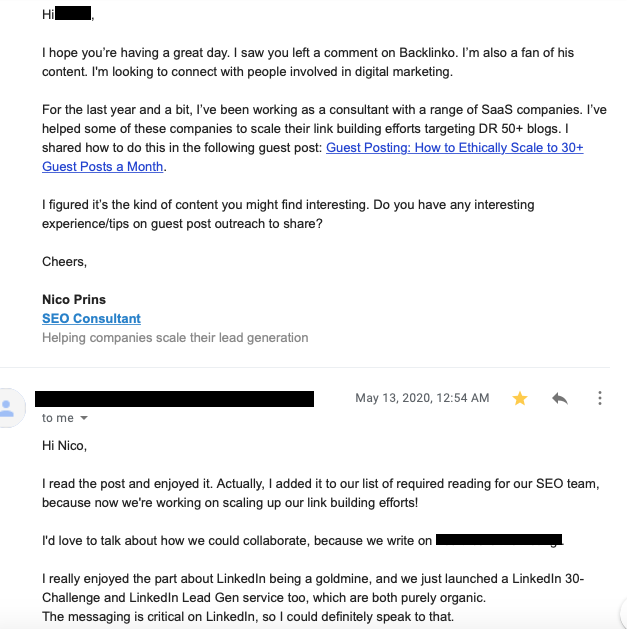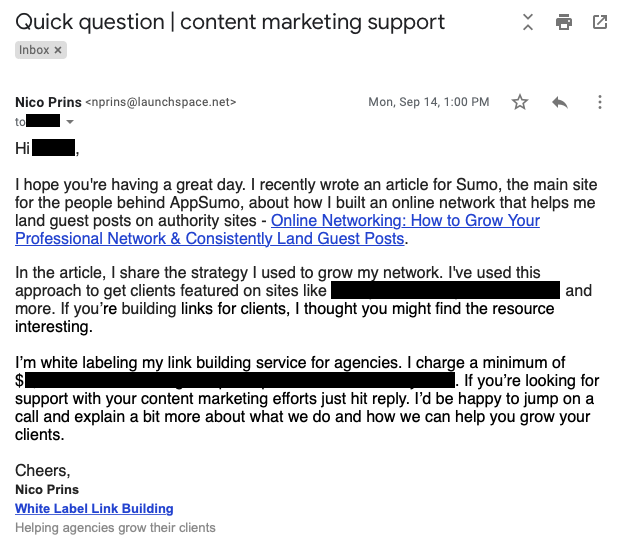30-second summary:
- Most content marketers focus on creating blog posts and writing guest posts to improve SEO rankings. This approach overlooks the value of insightful content as a sales resource, especially for B2B firms.
- What type of content works best for sales prospecting. Examples of content and an overview of how to create your outreach list.
- An overview of two campaigns where blog content was used to generate leads for an SEO agency. Included in the overview are email templates and campaign outcomes.
- How to review and optimize your content marketing outreach campaigns to generate more leads for your business.
Significant business resources are invested in creating content that is never engaged with, writing guest posts that are never read, and sharing content that is never seen. It’s a reality that most of us choose to ignore because we are fixated on inbound marketing.
While inbound marketing is effective, it’s not without problems:
- Most of the visitors who engage with your content will never return. It’s generally agreed that somewhere in the region of 2%-6% of first-time visitors return to a website.
- You have little control over who visits, and most visitors do not fit the profile of your customer persona (you’ll be doing very well if you convert even 0.3% of site visitors into customers).
- There are only so many spaces on the front page of Google. Truthfully, most of us will be fighting and failing to achieve our desired SERP rankings.
Outbound marketing sidesteps two of those three issues.
When you create a list of companies that fit your target demographic and then send emails to the relevant people in that company, you gain a degree of control over who consumes your content. Where you sit in the search rankings will not impact the outcome of your campaign.
While most sales teams use outbound marketing, few companies coordinate their content marketing efforts with outbound sales initiatives.
I believe that this is an oversight. I’ve secured several new customers for my agency in the last three months by coordinating my sales and content marketing efforts.
This guide will share an approach that I believe can help all businesses, but especially small to medium-sized businesses, that operate in the B2B space acquire new customers. It’s a strategy that relies upon creating a small amount of really great content, then actively promoting that content to the right people. Let’s dive in.
1. Consider the goals of your customer
Ideally, your outbound marketing strategy should neatly fit into your long term content marketing goals. For me, an optimal content campaign that aligns with sales should look something like this.

At the start of the campaign, you need to identify relevant keywords to target.
The keywords you pick should align with your ideal customer’s pain points and the solution that you offer either through your product or service. For example, at my company, we help businesses in the SaaS niche secure guest posts on relevant sites. I decided that the initial outreach campaign would be based around my guide on how to guest post.
You can see how the topic aligns with the solution.
If you’re going to run an outreach campaign that utilizes content from your site, you must use informative content that offers value. After all, the article will be the first impression that you leave with a potential customer interacting with your business.
You can create multiple pieces of content around your product or service offering. However, I recommend you start with one piece of cornerstone content.
2. Create a customer outreach list
There is a good chance that you already have a strategy in place to promote new content. Often, that involves creating a list of sites that have linked to a competing piece of content. You then find the contact details of the author and send them a message asking for a link.
A sales outreach campaign based around a piece of content is just as straightforward. However, the goal and who you target is different.
I’ll assume you have a customer persona. You know what type of companies buy your products or services. You need to create a list of suitable companies. You can use resources like Google My Business, the Inc 5,000, and other business roundups to quickly create a list of suitable companies to contact.
Once you’ve created your shortlist, you need to find the details of the person in charge of purchasing decisions at each company. For an SEO agency, that person typically has a job title like ‘Chief Marketing Officer (CMO)’.
I generally use a combination of LinkedIn and an email finder to get their contact details. Hunter and Voila Norbert both offer 50 free searches, which is enough for an initial campaign.
Pull all of that information you collect into a Google Sheet.
3. Run your outreach campaign
There are numerous types of sales outreach campaigns you can run that incorporate blog content. For example, I collected the details of everyone who left a comment on the Backlinko blog. I removed individuals and companies that didn’t fit my customer persona and sent them all an email.
Below is a screenshot of the email template I used alongside one of the responses.

You can see this is a soft sell. The only reference to the service I offer is my email signature that links to a sales page. The primary resource in the email was this blog post.
I wanted to start a conversation with prospective customers not generate an instant sale.
This particular outreach campaign, which was sent to around 200 people, generated two leads. In addition, I was asked to appear on a podcast and was offered a couple of guest post opportunities.
You can be more direct. Here is an example from another campaign.

We leveraged the credibility of Sumo for this sales campaign. The company has more brand recognition than Launch Space, a site that few people would recognize.
The primary resource used for the Sumo sales campaign was this article. The guest post fits the criteria of a cornerstone piece of content. It’s actionable, insightful, and relevant to the needs of prospective customers.
You might have noticed that I adapted my email signature for the campaign. We generated two leads from our first 100 emails.
4. Review the results
If this is your first campaign, I recommend you send outreach emails to between 100-200 companies. Send your emails, then a week or two later, review the results.
The first campaign we ran had a 1% conversion rate. I sent 100 emails and got one customer.
The math was simple.
I didn’t use any marketing tools for the campaign. You might choose to start the same way.
To improve the results of any marketing campaign, you need to track relevant metrics. There are plenty of affordable email tracking tools that provide insights like email opens, link clicks, and other statistics.
Good email tracking tools will allow you to split test your copy. You’ll also gather information on when people open your email and who opened your message multiple times but didn’t respond. You can use this data to improve your campaign results, for example, by scheduling your emails for the optimal time or day of the week or deciding on who to send multiple emails to.
Wrapping up
In this guide, I outlined how you can include blog posts and guest posts in your cold outreach to generate leads for your business. It’s a strategy that I’ve used to consistently land fresh clients, which has, in turn, helped me grow my business.
If you’re a B2B company selling a product or service with a high-profit margin, outbound marketing will normally provide you with a positive Return On Investment (ROI). It’s logical to utilize blog content as a sales resource, especially if you presume that the content will eventually generate leads through inbound marketing. Most companies don’t do this; I hope this article has provided you with the impetus to try.
Nico Prins is an online marketer and the founder of Launch Space. He helps companies develop their digital marketing strategies. He’s worked with everyone from Fortune 500 companies to startups helping them develop content marketing strategies that align with their business goals. Follow him on Twitter @nhdprins.







